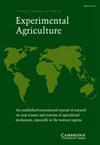椰子(Cocos nucifera L.)花粉萌发和花粉管生长的最适温度与生长温度密切相关
IF 1.9
4区 农林科学
Q1 Agricultural and Biological Sciences
引用次数: 0
摘要
摘要 了解作物性状对温度变化的反应对于预测作物如何应对温度升高非常重要。尽管我们对温度升高对农作物生长和发育的影响有了充分的了解,但对气候变暖如何影响农作物的生殖过程仍缺乏有力的评估。在本研究中,我们通过实验研究了生长温度如何影响广泛分布的树种作物椰子(栽培品种:斯里兰卡高杆椰子)体外花粉萌发的主要温度。我们假设花粉萌发和花粉管生长的最佳温度将由生长温度决定。我们的研究结果表明,花粉萌发和花粉管生长的最适温度在温度相对较高的地点(年平均气温在 28 ℃ 以下的地点)高于温度较低的地点(年平均气温在 22 ℃ 以下的地点)。在温度较高的地点,这两个过程的协调性更好。我们推测,目前生长在相对较冷环境中的热带树种可能有能力在未来较暖的气候条件下发挥其生殖生理功能,而不会受到任何实质性的负面影响。这项研究的结果将有助于量化气候变暖对热带农业生态系统的潜在影响,改善作物模型中植物繁殖的表现形式。本文章由计算机程序翻译,如有差异,请以英文原文为准。
The temperature optima for pollen germination and pollen tube growth of coconut (Cocos nucifera L.) strongly depend on the growth temperature
Abstract Understanding trait variation in response to temperature is important to predict how crops respond to rising temperature. Although we have a sound understanding of the effects of increasing temperature on growth and development of crops, a robust assessment of how crop reproductive processes are affected by climate warming is still lacking. In this study, we experimentally investigate how the growth temperature affects the cardinal temperatures of in vitro pollen germination of widely distributed tree crop species Cocos nucifera L. (cultivar Sri Lankan Tall). We hypothesize that temperature optima for pollen germination and pollen tube growth would be determined by the growth temperature. Our results showed that the temperature optima of pollen germination and pollen tube growth were higher at relatively warmer sites (sites where the mean annual temperature ∼ 28°C) compared to the cooler sites (sites where the mean annual temperature ∼ 22°C). The two processes were better coordinated at warmer sites. We speculate that tropical tree species that are currently growing in relatively cooler environments may have the capacity to perform their reproductive physiological functions in future warmer climates without any substantial negative impacts. Findings of this study should prove useful in quantifying the potential impacts of climate warming on tropical agro-ecosystems, improving the representation of plant reproduction in crop models.
求助全文
通过发布文献求助,成功后即可免费获取论文全文。
去求助
来源期刊

Experimental Agriculture
农林科学-农艺学
CiteScore
2.50
自引率
6.20%
发文量
29
审稿时长
24 months
期刊介绍:
With a focus on the tropical and sub-tropical regions of the world, Experimental Agriculture publishes the results of original research on field, plantation and herbage crops grown for food or feed, or for industrial purposes, and on farming systems, including livestock and people. It reports experimental work designed to explain how crops respond to the environment in biological and physical terms, and on the social and economic issues that may influence the uptake of the results of research by policy makers and farmers, including the role of institutions and partnerships in delivering impact. The journal also publishes accounts and critical discussions of new quantitative and qualitative methods in agricultural and ecosystems research, and of contemporary issues arising in countries where agricultural production needs to develop rapidly. There is a regular book review section and occasional, often invited, reviews of research.
 求助内容:
求助内容: 应助结果提醒方式:
应助结果提醒方式:


